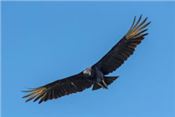UK And Purdue Seeking Calves Lost To Or Injured By Black Vultures

A black vulture in flight.
Photo Getty Images
LEXINGTON, KEN.
It’s not a surprise to seasoned cattle producers that black vultures will prey on newborn calves. The University of Kentucky College of Agriculture, Food and Environment is teaming up with Purdue University, the U.S. Department of Agriculture Wildlife Services and the Denis H. Heeke Animal Disease Diagnostic Laboratory in southern Indiana to study the problem.
Assistant professor of wildlife management Matthew Springer is leading the efforts at UK. The group is requesting that producers donate calves or other livestock to the research effort, if they believe the animal was lost to black vultures.
“The goal of this project is to determine the characteristics of an animal killed by a black vulture versus one that is just scavenged upon,” Springer said. “This research should help inform any indemnity loss applications through the USDA Farm Service Agency.”
Springer said the group is prioritizing animals that producers saw being attacked. Someone from UK will pick up the animals and take them to the Heeke lab for examination of injuries and necropsy. Researchers will catalog the results to determine the features of a vulture attack.
“Given the extensive nature of the necropsy, the carcasses need to be in good shape and preferably found within 24 hours of the attack,” Springer said.
Researchers are also seeking black vulture nest sites throughout Kentucky as part of a larger black vulture research effort in the Southeast United States. The larger project is a collaboration with the Murray State University Biology Department and USDA Wildlife Services “Our goal with the larger study is to better understand the nesting behavior and survival of black vulture nests as well as fledgling movement and survival rates,” Springer said. “The research fits into a larger overall push by USDA Wildlife Services to better understand black vulture populations and behaviors.”
Springer said the overall goals of these efforts are to improve understanding of the black vulture and to identify future management strategies to help overcome vulture-related damages.
“This project should help us understand the reasons for the increase in black vulture populations and help minimize human-vulture conflicts in the future,” he said. “If you know of a nest site and would be willing to allow us access to monitor it, please contact us.”
The team will monitor nests using trail cameras to observe nesting behavior and any predation events until chicks leave the nest. The team will briefly visit nest sites every 10-14 days to collect the memory card and check the nesting status. They will attach GPS transmitters to a subset of fledglings when they reach the necessary size and age later in the summer.
“We would be especially grateful if you could report nests as soon as you become aware of them, as we are currently within the vulture breeding season,” Springer said.
Cattle producers interested in helping with the projects should contact Springer at mattspringer@uky.edu, 859-257-8633, or Phil Kavouriaris at Murray State University
msu.blackvultures@murraystate.edu, 270-288-6097. ∆